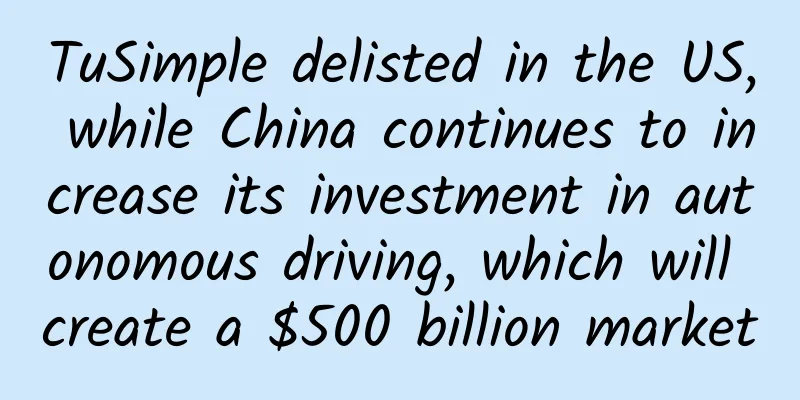TuSimple delisted in the US, while China continues to increase its investment in autonomous driving, which will create a $500 billion market

|
After a series of setbacks, TuSimple, an autonomous driving company that was once a darling of the autonomous vehicle industry and completed its IPO in 2021, raised more than $1 billion. However, the company has since gone through restructuring and layoffs, cutting more than 30% of its global workforce and shutting down its U.S. operations. It is estimated that TuSimple’s market value is currently only about $100 million, compared to a high of $8 billion at the time of its IPO. TuSimple is expected to delist on Feb. 7, partly because of growing doubts about the viability of self-driving car companies amid tough economic and regulatory conditions. Not long ago, General Motors' Cruise was also exposed for safety issues, which led the company to lay off about 24% of its employees and shut down its self-driving taxi business in San Francisco. Regarding TuSimple's business, Lionel Robert, a professor of robotics at the University of Mexico, believes: "It is clear that TuSimple cannot deliver technology not only now, but more importantly, it cannot deliver in the foreseeable future. Their tunnel is too long, they can't see the end, and they can't see the light, so they have to delist." 91che believes that TuSimple’s delisting highlights the real dilemma of the global autonomous driving industry except in China. After years of development and testing, this futuristic technology has not been quickly popularized around the world as industry insiders and investors had expected, replacing human drivers and providing safer travel services. Whether it is the United States or Europe, they all seem to have encountered bottlenecks in the field of autonomous driving. So, will China's autonomous driving industry be affected? Does it still have a future? First of all, from the policy perspective, China's autonomous driving industry has received strong support from the government in the past few years. Since 2022, the national and local governments have introduced a series of policies and plans to promote the healthy development of autonomous driving related industries. Second, in terms of technological progress, many companies have begun to accelerate their efforts to transition from L2+ autonomous driving to L3. Major automakers and parts suppliers are deeply engaged in autonomous driving. Domestic brands such as Chery, Geely, Wenjie and Zhiji have successively released cars equipped with L3 autonomous driving functions. In July last year, BYD, a leader in new energy vehicles, won the country's first L3 autonomous driving test license. Subsequently, many automakers including BMW, Mercedes-Benz, Zhiji, Arcfox, and Changan Automobile officially announced that they had obtained L3 autonomous driving test licenses. In addition to car companies, some technology companies have also targeted the autonomous driving market and have begun to launch commercial autonomous driving taxi services in some cities. Baidu's "LuoBo KuaiPao" has launched autonomous driving travel services in cities such as Beijing, Shanghai, Guangzhou, Shenzhen and Wuhan. According to the financial report released by Baidu, in the third quarter of 2023, LuoBo KuaiPao provided more than 821,000 services, a year-on-year increase of 73%. As of September 30, 2023, the cumulative number of orders provided by LuoBo KuaiPao to the public reached 4.1 million. Antu Zhixing has also deployed in eight regional cities, with five R&D centers in Shenzhen, Beijing, Shanghai, Guangzhou and other places, a driverless car production line in Changzhou, and ten operation centers in Shenzhen, Shanghai, Guangzhou and Beijing to support the operation of local driverless fleets. Currently, the scale of the driverless taxi fleet operating on public roads exceeds 1,000 vehicles. Third, from the perspective of the supply chain, China has a complete autonomous driving industry chain, and every segment of the autonomous driving technology stack has local suppliers in China. Domestic companies such as Desay SV, Neusoft Reach, Jingwei Hairun and Huawei have been deeply involved in the autonomous driving industry for many years, which is enough to support the development of the local autonomous driving industry. Finally, Chinese consumers and users are also very receptive to new technologies. JD. Power's 2021 Autonomous Driving Confidence Index survey shows that Chinese consumers' confidence index in autonomous driving technology is 50 points, 39% higher than that of American consumers (36 points in the United States), which shows that Chinese consumers are more receptive to autonomous driving and have stronger confidence in it. Research by McKinsey's Future Mobility Research Center also shows that Chinese consumers are willing to pay a premium of up to $4,600 to purchase self-driving cars, while American consumers are only willing to pay a premium of $3,900. In the same year, the "Chinese Consumers' Attitudes and Willingness towards Smart Cars Survey" released by IDC also showed that nearly 80% of consumers said that their confidence in autonomous driving has increased over the past year. The main reasons include the popularity of autonomous driving, publicity and marketing related to autonomous driving, and personal experience with autonomous driving. To sum up, although the autonomous driving industry has encountered some difficulties, at least from the perspective of the Chinese market, this emerging technology still has broad development prospects. Deloitte has predicted that the number of self-driving cars in China will reach 30 million by 2030. McKinsey believes that China is likely to become the world's largest self-driving market in the future, and by 2030, new car sales and travel services related to self-driving will generate more than $500 billion in revenue. Delisting from Nasdaq and exiting the US market may be just a pain for the troubled TuSimple. The company said that its focus in the future will be the Chinese market. After the "China-US dual market" strategy proved to be unsuccessful, the company decided to focus all its energy on the domestic market. Although there are many competitors in the Chinese market, at least this market is big enough. As a winner of Toutiao's Qingyun Plan and Baijiahao's Bai+ Plan, the 2019 Baidu Digital Author of the Year, the Baijiahao's Most Popular Author in the Technology Field, the 2019 Sogou Technology and Culture Author, and the 2021 Baijiahao Quarterly Influential Creator, he has won many awards, including the 2013 Sohu Best Industry Media Person, the 2015 China New Media Entrepreneurship Competition Beijing Third Place, the 2015 Guangmang Experience Award, the 2015 China New Media Entrepreneurship Competition Finals Third Place, and the 2018 Baidu Dynamic Annual Powerful Celebrity. |
<<: A comparison of the photography features of Redmi 1S, Honor 3C and Redmi Youth Edition
Recommend
I ate 160 bags of chicken breast in one month and my kidneys couldn't take it anymore!
Audit expert: Shen Yingjian Director of the Nutri...
HTC One with WP8 GDR3 system to be unveiled at the end of the year: supports Wi-Fi data recovery and rotating lock screen
[September 9 news] Screenshots of the WP8 version...
The UV of e-commerce skyrocketed during Double 11. How can we write the most eye-catching entrance copy?
In 2009, Alibaba turned "Singles' Day&qu...
Why don’t we see buttock injections anymore, as we used to do when we were kids?
One minute with the doctor, the postures are cons...
The sunglasses you wear everyday don’t work when you drive?
In summer, many people go out fully armed and wra...
Write a WeChat article with 100,000+ views
There are often some media colleagues and media a...
Xu Meishan: The most important thing about home feng shui
Xu Meishan: The most important thing about home f...
How to reduce APP uninstall rate? Here are seven ways!
The mobile application market is now a crowded ma...
Don't be careless after a flood! Get these health and epidemic prevention knowledge quickly!
Recently, affected by the typhoon, rainfall has o...
Alcohol Myths and Realities: Can You Have One Drink?
© Imagno/Getty Leviathan Press: For those who are...
Analysis of Xiaohongshu's competitive products
From sharing overseas shopping to establishing it...
3 kinds of food that are good for your eyes, remember to eat more! See if there is any you like?
In today's society, people spend more and mor...
Counterfeiting is coming! Who will take care of the strongest counterfeiting brand in nature? A plant "counterfeit" the entire forest
Produced by: Science Popularization China Author:...
Smells so good! Pitcher plants stop eating bugs and start eating feces, and they're actually doing better!
Due to their cute shapes and unique habits, carni...
How much does it cost to develop a Shantou watch mini program? Shantou watch applet development price inquiry
In order to better penetrate into various industr...









